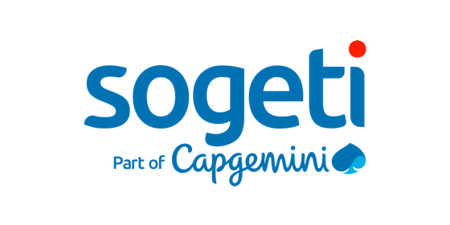
Client:Sogeti Partners
Industry:High Tech
Region:Asia Pacific & Japan
Sogeti and UiPath Partnership Helps Maximize Business Value for Customers

Client Overview
Part of the Capgemini Group, Sogeti is an IT consulting company headquartered in France. Through its 270,000 people strong workforce across 40 countries, the company offers a comprehensive portfolio of services spanning Analytics, Artificial Intelligence (AI), Automation, Digital Assurance and Testing, Cloud and Cybersecurity. These solutions are tailored to the specific needs of its clients across industries, including finance, public sector, manufacturing, automotive, life sciences, telecom, media and entertainment, energy and utilities.
Sogeti Partners with UiPath to deliver cost-efficient RPA innovation to help accelerate its customers’ automation journey with maximum business impact.
Automation is a key pillar of Sogeti’s value proposition around delivering cost-efficient innovation through future-focused solutions that enable the digital enterprise. Its philosophy around automation is built on the belief that automation is a journey that machines cannot make alone. Therefore, Sogeti sees its role as that of helping businesses navigate the change as they embark on the automation journey to help maximize ROI and drive business transformation.
Geared towards delivering intelligent automation, Sogeti’s automation practice brings together unified, open and dynamic suite of automation tools, services and expertise. With Robotic Process Automation (RPA) as a key lever of this automation ecosystem, the company derives significant value from its partnership with UiPath.
UiPath’s entry into our automation ecosystem happened at just the right time as we were looking for a very nimble, agile and simple RPA platform. The partnership has grown to provide a strategic edge as we approach our customers to help accelerate their automation journey, making it our partner of choice and go-to RPA platform. The platform’s proven success around generating rapid results is aligned to and in sync with our outcome driven RPA value proposition to our customers globally.
Sanjay Chalke • Global Head of Automation, AI and Analytics, Sogeti
UiPath enables Rapid Start for faster RPA implementation
With its rapid results advantage, UiPath is particularly key to materializing Sogeti’s concept of ‘Rapid Start’, which is a set of methodologies developed in-house to help its engineers fast-track the use of RPA technology to deliver to its customers.
According to Balaji Rajagopalan, Automation & AI Leader at Sogeti, “The capability of UiPath around delivering rapid results has made it ideal to work with for engaging the ‘Rapid Start’ concept in our client engagements. This has helped bring more agility into our RPA projects.”
He cites an example wherein the company successfully delivered a production-ready bot in less than 10 days for one of its clients in North America using Rapid Start.
Streamlining the outcome-focused automation journey for customer
This is just one of the many success stories coming out of Sogeti and UiPath’s partnership. A key factor determining these success stories is the foundation of well-defined, streamlined and outcome-based automation journey built on ESOAR, a Capgemini patented methodology for developing automation solutions.
ESOAR stands for Eliminate, Standardize, Optimize, Automate, Robotize. It starts with identifying upfront processes that are right candidates for automation upfront, followed by creation of process definition document leading up to automating the process.
To help customers get a closer look of automation and better feel of it, Sogeti does something called ‘proof of value’, which tries to establish the link between the manual process and how it will be in the digital world and gives the customer a look at the Bot, a working prototype with a happy path.
Capgemini has an internal library of over 800+ bots and more than 3200 use cases, thus accelerating RPA implementation for similar use cases.
According to Balaji, the ESOAR methodology enables a holistic approach to process transformation through automation to deliver maximum impact and outcomes for the business with minimal expenditure.
A key imperative of Sogeti’s approach to automation is the outcome, which is what ultimately counts. “We see majority of our clients’ expectations from RPA pivoting on cost optimization, error rate reduction, faster throughput, better cycle time and attrition management among others. Every customer deal that we work on at Sogeti, especially the large ones, we incorporate well defined metrices around these business impact areas - RoI, productivity, etc. We even define the payback period. To give an example, if the customer is spending $100 on developing a Bot, in how many months can it be recouped by the client,” explains Sanjay.
Synergized offering with UiPath across all types of customer engagements
Sogeti’s 400 people-strong global automation practice caters to the entire spectrum of customer engagement models—right from those looking at a purely automation objective to those looking to drive the larger digital transformation agenda with RPA as one the plugs.
According to Balaji, Sogeti has three types of RPA engagements with its clients, which include hunting, farming, and productivity enhancements. In hunting, Sogeti doesn’t go for the big bang approach and focuses only on automation. Typically these projects are closed fast and focus on operating the key processes and delivering value within a very short time.
In farming, the company leverages its long-standing engagements and depends on existing customer engagements to plug-in automation for value enhancement. Once the right processes are identified through a joint discovery workshop with the customer, RPA implementation follows.
Productivity enhancements—the third piece of the RPA engagement—involves existing accounts with fixed price and fixed scope of work, wherein the customer pays a fixed fee per year for a certain work product. RPA is brought in as a productivity enhancement measure to do the work faster, better, and more cost-effectively.
The synergized RPA value offering with UiPath spans across all three types of engagements, wrapped around an offering-led approach. The set of offerings are built as a service, which is a fixed-price, fixed team model for its customers to get their processes built and run as a service.
Journey forward: congruence of RPA with AI/ML
The future of RPA, as Sogeti sees, is congruence with AI/ML. “The path that we see RPA traversing going forward is to move beyond just screen scraping and automating some manual activity and become a truly cognitive worker which can help understand patterns, event insights and take decisions. This is where integration of RPA with AI/ML is imperative and a key engine that we are ready with as part of our intelligent automation offering, though most of the customers are still at a nascent stage with an appetite of simple classic automation,” explains Sanjay.
Regarding use cases going forward, Sogeti expects more demand for powerful RPA use cases around HR onboarding/offboarding and license management. Besides, the company expects some re-calibration post COVID-19 as clients are challenged with keeping the lights on and getting overwhelmed with huge volumes of requests piling up, whether it is unemployment insurance, healthcare insurance or service request tickets for RSA tokens, password resets, etc.
Our partnership with UiPath will be strategic in creating joint value propositions that can help businesses not only cater to their immediate requirements around keeping lights on amid the COVID-19 crisis but also build future-proof RPA solutions that help transform their operations for the better in the long run as well.
Balaji Rajagopalan • Automation & AI Leader, Sogeti
This is pivoting a lot of Sogeti’s immediate focus on use cases, helping clients in doing business and addressing growing query loads besides the regular use cases.
Customer Success Stories with UiPath
1. Implementation of health record assistant for independent, nonprofit health plan company in U.S.
The challenge:
The client wanted to move all the existing health records (20,000+) from Clinical Case Management System (CCMS) to HealthRules (HR) application.
The solution:
Each record from CCMS is validated against the master data for their respective mapping values in HR application.
Identify and maintain the sequence of all the health records for a single patient/end user/customer.
Maintain mapping of CCMS ID with the newly generated HeathRule ID.
Record entry adhering to business rules set by the client.
The results:
Accuracy: 100% accurate
Security: 100% secure
24/7: 100% Availability
Confidentiality: 100% Confidential
2. Automation of health claims verification for leading U.S. health insurance company
The challenge:
With the release of new system every year, claims processing would go on hold for months until the system is verified to be correct. The client needed a solution that would provide faster validation of claims and support the increasing volume of claims during new releases while maintaining accuracy in testing.
The solution:
Developed risk-based testing framework for validation and verification of claims.
Verified more than 40K claims in a period of five months.
Processing of 300 claims per hour.
Developed automated report generation for verified claims.
The results:
Time efficiency: 100% faster
Audit trail: 100% tracking
Accuracy: 85% accurate
Security: 100% secure
24/7: 100% Availability
Confidentiality: 100% Confidential
3. Automation of repetitive tasks for a global leader in electrical, industrial and communications products
The challenge:
The process required 100% manual work.
The business wanted to leverage the RPA capabilities, as the process consists of repetitive tasks.
4 FTEs were involved in the process.
55-60 shipment routes created per day with average time of 15-20 min/route.
The solution:
Created a bot using UiPath to process all major parts of the process, except for the steps where a negative scenario occurs.
The bot logs in to the site, downloads the list of branches, and selects the branches allocated to it.
The bot processes each branch one after another without human intervention.
After all the branches are completed, the bot sends the completion mail to the business with attached list of routing details.
Maintains a log for each day process.
The results:
Bot triggers automatically as per schedule, so no need for any human intervention to trigger the bot.
Bot triggers multiple times in a day and processes the branches and optimizes the routes if available in the system.
Quick turnaround.
Accuracy of the process achieved.
Logs sent to business after every run for audit purpose
4. Automating service ticket resolution for a leading U.S. accounting and advisory organization
The challenge:
Monitoring tools create tickets 24x7 if health of an insight service reaches a certain threshold.
These tickets had to be manually resolved in Remedy.
Response and resolution SLA would get breached during non-business hours and weekly offs.
Inflow of tickets was sporadic, with no specific pattern.
The solution:
It was decided to automate the repetitive task of ticket resolution and closure.
Tickets were identified for which solutions were repetitive.
Workflows were created to identify a ticket and resolve it by verifying health of the service in Insight Admin console.
Bot was programmed to repeat the workflow for such tickets.
Workflow was scheduled to run 24x7 at frequent intervals.
The results:
Time originally spent in resolving these tickets is utilized for other business activities like MERs, projects, POCs, and application improvement suggestions.
On-call resource is no longer needed to meet SLA of such tickets during off-business hours and weekends.
Ticket inflow would increase if application usage increased during peak business hours. Such situations are now handled effectively by the Bot.
Possibility of human error in meeting SLAs & resolving tickets has been considerably reduced.
5. Automating leaver process for a leading U.S. accounting and advisory organization
The challenge:
The client support team gets nearly 1,000 tickets per month for processing separation of employees.
These tickets are created based upon the information sent by HRO for employee separation.
One person is assigned to read employee separation email. If the termination date is past two days, then “Raise Request for Leaver” in remedy application.
Turnaround time was affected.
The solution:
It was decided to automate the repetitive task of ticket creation based on HRO email.
Send Emails address were identified and outlook rule was to set to move emails from those HRs and with specific subject line to an outlook folder.
A bot was created to read every email from outlook folder and open a Leaver request in remedy if qualifying the criteria.
Bot is scheduled to run each hour 24X7.
The results:
Tickets created within an hour of email from HRO team. Therefore, quick turnaround for the leaver process.
One FTE saved and the resource is utilized in actual processing of the leaver request.
Possibility of creating early or delayed request ruled out as the bot reads all the emails and creates tickets only for employees, which have termination date past two days.
Possibility of human error in creating ticket from email minimized.
6. Automating joiner process for a leading U.S. accounting and advisory organization
The challenge:
The client support team gets nearly 1,000 tickets per month for new joiner setup.
These tickets are created based upon the information sent by HRO regarding new joiner.
One person is assigned to read new joiner email and “Raise Request for New Joiner” in remedy application and maintain weekly report for all the new joiners.
Turnaround time was affected.
The solution:
It was decided to automate the repetitive task of ticket creation based on HRO email.
Send Emails address where identified and outlook rule was to set to move emails from those HRs and with specific subject line to an outlook folder.
A bot was created to read every email from outlook folder and open a new joiner request in remedy.
Bot is scheduled to run each hour 24/7
The results:
Tickets are created within an hour of email from HRO team. Therefore, quick turnaround for the new joiner process.
1 FTE saved and the resource is utilized in actual processing of new joiner request.
Even in the case of bulk hiring, new joiner requests are immediately created.
Possibility of human error in creating ticket from email minimized.
Weekly report sent with new joiner details without fail and without involving any FTE.
Related case studies
Ready for your own case study?
Speak to our team of knowledgeable experts and learn how you can benefit from agentic automation.




